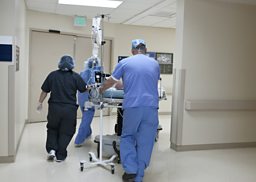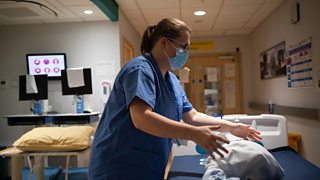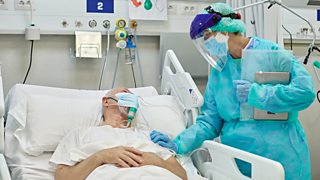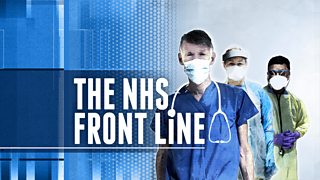The Coronavirus Doctor's Diary
Prof John Wright, a medical doctor and epidemiologist, is head of the Bradford Institute for Health Research, and a veteran of cholera, HIV and Ebola epidemics in sub-Saharan Africa.
Since April 2020 he has kept a diary for Βι¶ΉΤΌΕΔ and recorded from the hospital wards for Βι¶ΉΤΌΕΔ Radio 4's The NHS Front Line.

-
![]()
The NHS Front Line
Recordings with frontline staff at Bradford Royal Infirmary, taking you behind the scenes on the wards as they plan for the onset of COVID-19 and then cope as the patients arrive.
I am a medical doctor and an epidemiologist. I grew up with a yearning for excitement and adventure. As a medical student I was drawn towards the exoticism of tropical infections and the red, sunbaked earth of Africa. My NHS training taught me about Western diets and unhealthy lifestyles and the heart disease and cancers that they inevitably caused in our ageing populations. Chronic diseases of which we could treat the symptoms, but rarely cure. Infectious disease was a different planet, affecting young people whose lives we could save with simple medicines and vaccinations.
I met Helen, my wife, as a 4th year medical student and we made a pact to elope together to Africa as soon as we had completed our postgraduate hospital exams. After ten years of training, we married and set off to run a rural African hospital, where we dealt with cholera epidemics in the worst droughts in living history, and experienced at first hand the devastating tsunami of HIV/AIDS as it swept through the continent. While we returned to the UK to continue as NHS doctors we maintained a life-long link to Africa: when a call went out in 2014 for NHS volunteers to help contain the Ebola epidemic in West Africa I worked with the British army to set up an Ebola Treatment Centre in the middle of rural Sierra Leone and running it with a team of international staff.

So when I first read about Covid-19 in the medical journals, my 25 years of outbreak experience started flashing red lights and screaming alarms. This was clearly something different. A highly infectious disease that was spreading rapidly, not confined to poor countries but on the march. It was coming at exponential speed: first gradually and then very suddenly.

I describe the panic in our communities as fake news spreads like wildfire, scaring patients from coming to hospital and triggering nasty threats to our staff.
I work at a large teaching hospital in the North of England, Bradford Royal Infirmary. As the virus spread inexorably to my wards I knew more than most what was in store, and began a diary and daily recording for the Βι¶ΉΤΌΕΔ to capture the impact of the epidemic on the staff and patients.
It starts with Karen, our cleaner and her worries about her shielded husband and family. Her concern about bringing home a deadly infection from her work cleaning our toxic wards, a fear that ultimately turned out to be tragically prophetic.
I provide a fly-on-the-wall perspective as we drill and rehearse for an emergency that we have seen in graphic detail in news reports from overflowing Italian hospitals, but cannot possibly imagine in our Yorkshire home. In a strange new, terrifying world where doctors scramble to set up an additional ICU from scratch; there’s a shortage of ventilators and even oxygen; staff don't know what PPE they might get or when it might arrive, and relatives are being told that they won’t be allowed on wards, even when their loved ones are dying.
I follow the patients from their death-defying survival stories back to where they first became infected. I take on the role of a medical detective to trace the spread from local choirs to family funerals – super-spreading events that infected dozens of people in rapid succession with often tragic consequences.
I share the fear and turmoil of my colleagues as they face the biggest threat to their lives and the lives of their loved ones, putting themselves at risk on the NHS frontline. They tell their heart-breaking stories of bravery and creativity in the face of great adversity with remarkable candor.
My diary captures the urgency of our race to find cures for Covid-19, from novel drugs to old favorites. It describes the inventiveness of our doctors in using home CPAP machines to save lives in hospital and donated alcohol from gin distilleries to sterilise our respirators.
I describe the panic in our communities as fake news spreads like wildfire, scaring patients from coming to hospital and triggering nasty threats to our staff.
This is a Shakespearian tale with a cast of hundreds, everyone with their own deeply personal tale to tell. Above all, it is a unique social and medical history of the greatest threat to humanity in 100 years.

What the diaries reveal
This is the story of the unfolding Covid-19 crisis from before lockdown to the moment when Britain had reached one of the worst death rates in the world. Covid-19 has received overwhelming media coverage. Yet, with so much political debate, speculation and disagreement amongst specialists, and factual information to convey, thousands of human stories have been lost. This is an attempt through the experiences of a single hospital to tell some of them.

My diaries offer a bird’s eye view of the unfolding crisis, starting on March 12, four days before the Government launched the first of its daily briefings on the coronavirus response. I wanted to detail the process on a week-by-week basis as the hospital gears up for the anticipated arrival of the first patients.
For everyone involved, the experience is a new and bewildering one. As the pandemic spreads I’ examine its impact in the hospital and in Bradford itself – a proud city which I’ve grown to love and which I now know so well. Over the years we’ve formed strong bonds through our amazing Born in Bradford project, which is tracking the lives of 14,000 new-borns and their families. We are facing covid-19 together and right from the start we are united in our efforts.
Strong characters and bonds emerge as we pull together and tales of courage and commitment abound. Our 360 view is packed with heart-wrenching moments, from the couple who fell in love as teenagers who were now battling covid-19 together, through to the young lovers who married on the ward hours before one of them died of the disease. There are lighter moments as well, including an investigation to get to the bottom of the strange case of the choir that coughed in January!
And I follow up on some of those who left Bradford Infirmary after treatment for Covid-19: some are weakened and may have long term health conditions to contend with. Others have returned home to families or streets which had lost loved ones. Individuals and communities are being changed permanently by their experience of the virus. These aren’t just tales of hard working, dedicated doctors and nurses – they’re tales of the entire community and it is this integrated story that I wish to tell.

The Coronavirus Doctor's Diary
Dr John Wright's Diary is hosted by Βι¶ΉΤΌΕΔ News. Entries cover a fascinating range of Covid-related subjects. You can find them all here.
- 21 May 2021 Severely ill - and still made to quarantine in a hotel
- 05 April 2021 How the virus has changed our sleep patterns
- 15 Mar 2021 Has Covid changed hospitals for the better?
- 01 Mar 2021 Study shows one-in-three children have rarely been leaving the house
- 21 Feb 2021 Don't ask me which vaccine is best, please
- 13 Feb 2021 Will Covid be with us forever, like flu?
- 07 Feb 2021 Why are some of Bradford's elderly refusing the vaccine?
- 02 Feb 2021 Coronavirus doctor's diary: We're getting self-harming 10-year-olds in A&E
- 16 Jan 2021 Karen caught Covid from the hospital - and took it home
- 31 Dec 2020 "Close to death from Covid, I asked them to save my baby"
- 25 Dec 2020 "We turned 90, moved in together - then got the vaccine"
- 17 Dec 2020 "Have I got Covid for a second time?"
- 04 Dec 2020 "Covid killed my wife - so I'm taking part in a vaccine trial"
- 15 Nov 2020 The Yorkshire cemetery struggling to keep up with burials
- 10 Nov 2020 "We are first-hand witnesses of this devastation"
- 26 Oct 2020 "We blame Eat Out To Help Out for our tragedy"
- 18 Oct 2020 "We're no longer heroes - this is the new normal"
- 12 Oct 2020 A heartbreaking insight into the impact of lockdown
- 30 Sep 2020 Trying out tech that may help make worship Covid-secure
- 13 Sep 2020 Will universities be able to avoid spreading the virus?
- 06 Sep 2020 The "moonshine weddings" breaking Bradford's lockdown
- 30 Aug 2020 The fake news about schools that's misleading parents
- 02 Aug 2020 How gardening could help in the fight against obesity
- 27 Jul 2020 Will vaccine sceptics make trials a headache?
- 19 Jul 2020 So, did the Bradford choir have Covid-19 in January?
- 05 Jul 2020 Bradford worries about the whack-a-mole mallet
- 29 Jun 2020 A "dying" patient's miraculous recovery
- 10 Jun 2020 "People think it's over, but it's not"
- 05 Jun 2020 The older doctors risking their lives to battle Covid-19
- 31 May 2020 Why does Covid-19 make some healthy young people really sick?
- 26 May 2020 The drug combination that may help us beat Covid-19
- 24 May 2020 A patient given hours to live, who proved us wrong
- 19 May 2020 Did VE Day parties cause a spike in Covid-19 cases?
- 17 May 2020 A super-spreading funeral that led to three deaths
- 12 May 2020 "They say I have blood on my hands"
- 10 May 2020 The strange case of the choir that coughed in January
- 05 May 2020 Is lockdown good for your heart?
- 03 May 2020 Take care when you clap for carers
- 28 Apr 2020 "We aren't diagnosing many cancers now"
- 26 Apr 2020 A couple inseparable in sickness and in health
- 21 Apr 2020 The patient who married hours before dying
- 19 Apr 2020 "Fake news makes patients think we want them to die"
- 14 Apr 2020 A time when people say "Have you got a will?"
- 10 Apr 2020 "The most urgent research race in living memory"
- 07 May 2020 The oxygen supply problem
- 03 Apr 2020 Making rapid life-and-death decisions
- 30 Mar 2020 "Why are people stealing hospital supplies?"

